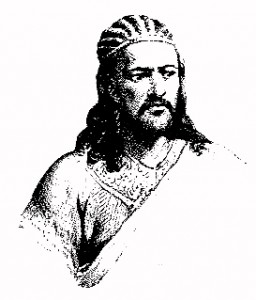by Lemn Sissay
 |
| King Tewodros II |
As one taken from his family through deception by the British government I have an interest in Prince Alemayhu. When I discovered him I can’t admit that I wasn't excited to find a kindred spirit. Like his my childhood is documented by the British government who refused to return me to my Ethiopian mother and hid the letters of her pleading for my return. Not an hundred years earlier government refused to return Prince Alemayhu and, after his death it came to light, they’d hid such letters from him.
The narrative established for me was that my Ethiopian mother and family didn’t want me. Effectively the same narrative was established for the prince. Both were proven to be untrue. I have utilised my life to prove my case. Prince Alemayhu didn’t have that opportunity. To the story. His father The King of Ethiopia committed suicide as the British troops descended upon his castle atop a hill in Magdala. The British army then took his son Prince Aleymahu – he was seven years of age - from Ethiopia to England.
 |
| Prince Alemayhu |
What follows is the official british narrative that having lost the battle in which thousands of his countrymen died, and before committing suicide, King Tewdros II made his wish known to the victors that his son should be taken by them to England. To believe this without question is insulting to say the least and willfully naïve at best yet this is what British history documents.
Within living memory of Prince Alemayhu’s passing journalist Hannah Pool was taken from Eritrea on the premise established by nuns that her parents were dead. This was untrue. There are many more African adoptees that are told untruths or convenient half truths about their birth parents which serve to force closed the door of an alternative and altogether more human narrative.
If you wouldn't mind me swerving from the central story I’ll try and explain what I mean by “an alternative and more human narrative”. When a mother gives up her child for legitimate adoption one could say it’s one of the most selfless and painful acts of humanity for a woman and yet more often than not the birth mother is castigated. Neither Hannah, Prince Alemayhu or myself were fostered or adopted in such a way still the fact remains.
Returning to the main story the circumstantial evidence of Alemayhu’s taking suggests there were more vainglorious reasons rooted in the pomposity of Victorian culture, a pomposity most eloquently documented by Dickens. Though race was not his subject if I recall. Where are the other examples in Ethiopian history of Ethiopian Kings willingly giving their children to the British? There are none to my knowledge.
However there is plenty of evidence of British soldiers raiding and looting Africa. Is it more likely Prince Alemayhu was one of the more vulgar exploits and spoils of The Battle of Magdala, to impress Queen victoria, in a primal exaltation of war. The army raided King Tewdros’s castle taking gold, historical texts and even the clothing of his wife the Empress who died months later. These garments are displayed today in the British Museum.
 |
| Prince Alemayhu |
But human chattel is more difficult to curate than the clothes of human chattel. In the story the boy loses favour with the British administration who were commissioned to pay for him. Is it a coincidence that this happens as he becomes an adult, an orphaned black man burned under the white heat from the sunlit magnifying glass of scrutiny that deemed him an unworthy exotic by virtue of his cast. Within eleven years of arriving in England at seven years old Prince Alemayhu of Ethiopia was dead and buried.
It’s documented that he died of pleurisy. I have the honour of documenting his the youngest example of a Great Life on radio 4’s brilliant series Great Lives presented by Mathew Parris On BBC Radio 4 Tuesday December 18th GMT. I am joined by Elizabeth Laird who wrote a fictional account of Prince Alemayhu’s life in the book The Prince Who Walked with Lions
Try reversing the telescope. Imagine every fact of his tale as having happened to the English where one hundred years ago an Ethiopian Army were victorious in the Battle of Windsor on English soil. The Castle of Windsor fell and The Prince and artifacts were taken to Ethiopia where The Prince of Wales – the heir - died at eighteen. Would the English want to redress the Ethiopian narrative that they had willingly given the English prince to the victorious King of Ethiopia who had buried their Royal highness outside the Coptic Church in Addis Ababa? Prince Alemayhu was forcefully adopted then abandoned by a country. If adoption is one of the greatest examples of humanity then abuse in adoption is one of the worst. We are, above all, our stories.
blog.lemnsissay.com
No comments:
Post a Comment